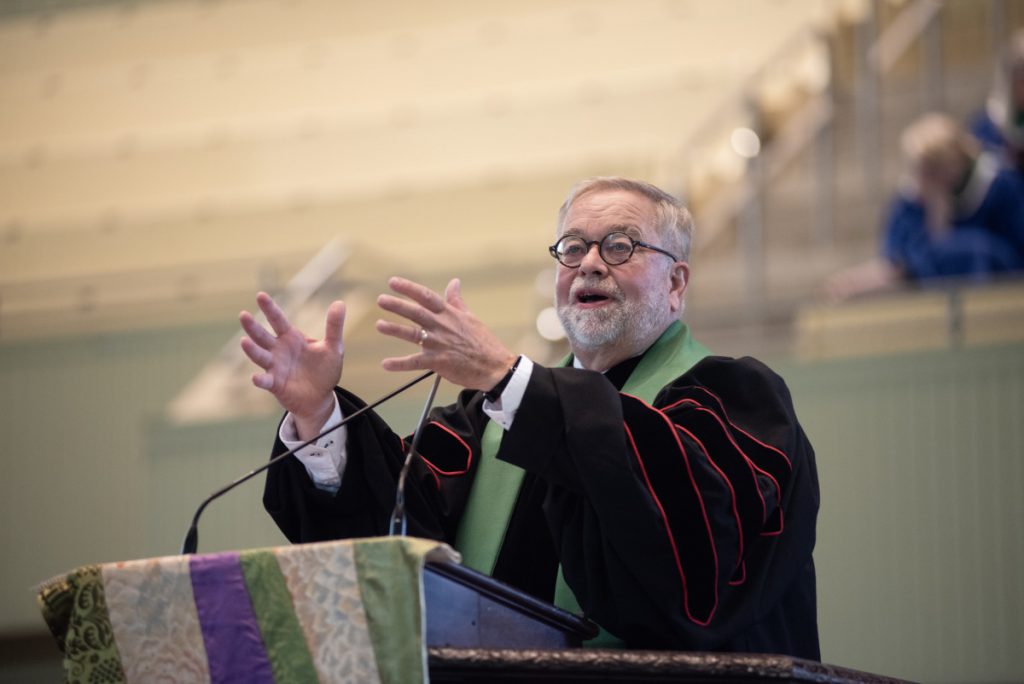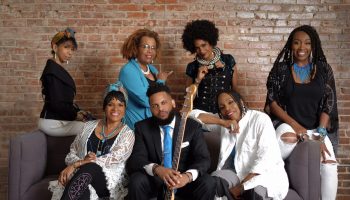
Column by Mary Lee Talbot
“Someone told me that the church is like a hospital. I had not thought about that,” said the Rev. J. Peter Holmes at the 10:45 a.m. Sunday morning ecumenical worship service in the Amphitheater. His sermon title was “One Hope, One Faith, One Hospital?” and the scripture readings were 1 Corinthians 12:4–7 and Mark 2:13–17.
Holmes is being treated for a very rare (one in a million) form of cancer at the Odette Center at the Sunnybrook Hospital in Toronto. “This one in a million does not feel like a blessing,” he said.
One day he went for a CT scan. It was a busy day as he registered and then went to the Section D waiting area. He had brought something to read to keep his mind off the scan and the possible results.
“I never saw it so busy, but I saw two seats at the end of a row and sat down and thought I would have some space. But no, a large man sat down beside me,“ Holmes said. “The wait went on, and there was a real sense of anxiety in the room. There was one young man with his parents who just kept raising his voice. People were moving away.”
He continued, “As a pastor, it is a hard place to be. It is a place of healing, and this is where I thought about the church being a hospital and the hospital being a church. I thought about the healing ministry of Jesus, that the sick need a doctor. Jesus was called to come and heal sinners, and we are all sinners. Sometimes the church is like a hospital.”
In Paul’s first letter to the Corinthians, he calls the Corinthians to embody the love, grace and healing of Jesus as they are Christ’s body. “Paul addressed the problems in Corinth like a doctor,” Holmes said.
This pouring out of life is good news, a moment of grace. Paul called the Corinthians back to communion. To know forgiveness and healing, to embody Jesus’ love and grace is to know the body broken for you. “We remember, as Jesus said, ‘So do this in remembrance of me.’ And as we turn back to Christ, we are re-membered, because he puts us back together to give us hope,” Holmes said.
The man who was sitting next to Holmes went over to the white board and looked at it. When he sat down again, Holmes asked the man who his doctor was. “Dr. X,” the man said. “Me, too,” Holmes said. Holmes asked the man when he found out he had cancer, and the man had cancer before Holmes.
The man said the name of the cancer and told Holmes that he had probably never heard of it. The man was one in a million. Holmes said, “Say no more. I am the one in the next million.” The man said, “I have never met anyone who has heard about it, let alone has it.” They talked about their doctors, treatments and other thoughts.
“Even though he had the cancer longer than I did, I went away feeling blessed, like I really was one in a million,” Holmes said. “I found a brother I did not know I had, and I was reminded that I was not alone. Church should be like that.”
The apostle Paul told the Corinthians they were all blessed because everyone had been given the Holy Spirit for the common good. They could focus on the needs of others, and no one was left out.
As Holmes went into the room to wait for his doctor, he heard the young man in the hall continuing to express his anxiety about the treatment his mother would get. “One of the things I heard as I was taken into the room, where I met my doctor a few moments later, was the son and his parents. I heard him in the hallway, and he was still expressing his anxiety to the medical staff bringing him in, and I heard his mother say, ‘Son, you don’t need to be afraid. I am in good hands.’ ”
He continued, “I thought of those volunteers at the cancer center. Some of them had been taking the brunt of the complaints, and they responded with such empathy, with such kindness as if they had been there, and then I thought of some of the volunteers at the church who are on the front lines of some amazing ministries, and I thought the church is like a hospital.”
Holmes told the congregation that he often ends his sermon with words from a hymn. This Sunday he was thinking about the words from a Bonnie Raitt song, “Down the Hall.” Holmes was in the hospital during COVID, and he read an article about a man in prison who started to volunteer in the prison hospice when he realized the men who were there had no one to care for them.
The man in prison washes the other prisoners’ feet and shaves their heads and holds their hands as they die. The song ends with these lyrics: “I can’t undo the wrong I did / Give back the life I took / But maybe when it comes my turn / I’ll get a second look. / I don’t know ‘bout religion
I only know what I see / And in the end when I hold their hand / It’s both of us set free.”
Holmes said, “Now, Bishop, you and I know something about religion, and that sounds like church to me. Amen. So be it.” The congregation applauded.
Bishop Eugene T. Sutton, senior pastor for Chautauqua, presided. Mary Henderson, lifelong Chautauquan and president of the Chautauqua Property Owners Association, read the scripture. The prelude was “Fanfare” by William Mathias, played on the Massey Memorial Organ by organ scholar Laura Smith. The Chautauqua Choir sang “Healer of our Every Ill,” music by Ken Medema and words by Marty Haugen. The choir was directed by Joshua Stafford, director of sacred music and the Jared Jacobsen Chair for the Organist, and accompanied by Owen Reyda, organ scholar, on the Massey organ. The offertory anthem, sung by the Chautauqua Choir, was “The Spirit of the Lord,” music by John Rutter and text from Isaiah 61:1–3,11. The choir was under the direction of Stafford and accompanied by Smith on the Massey organ. Reyda played “Final de Grand Pièce Symphonique” by César Franck. Support for this week’s chaplaincy and preaching is provided by The Alison and Craig Marthinsen Endowment for the Department of Religion.




